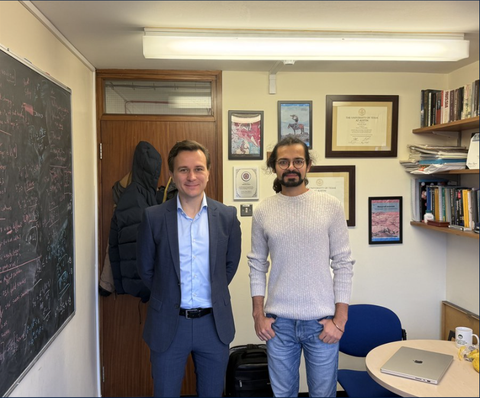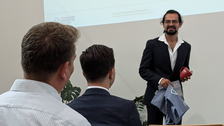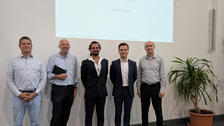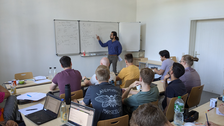Interview DRF Programm mit Bismark Singh und Tristan Becker
Bismark Singh (Associate Professor in Operational Research at the School of Mathematical Sciences at the University of Southampton, UK) is a Distinguished Research Fellow 2024. He was hosted at the Faculty by Tristan Becker (Assistant Professor of Business Administration, esp. Management Science), Udo Buscher (Chair of Business Administration, esp. Industrial Management) and Dominik Möst (Chair of Business Administration, esp. Energy Economics).
In the following interview, Bismark and Tristan talk about their experiences with the program.
@Bismark: As one of our Distinguished Research Fellows 2024, you spent two research stays at the Faculty and you invited Tristan to Southampton, and Udo. What is your impression? How has the collaboration with Tristan, Udo and Dominik developed over the last few months?
Bismark: My experience with the DRF has been extremely positive. During my first stay, I made strong connections not only within the faculty, but also with other faculties at TU Dresden. All four of us quickly identified a common research topic that aligned well with the DRF's goals - a crucial step for a meaningful collaboration.
A short time later, we brought a doctoral student from TU Dresden on board to join our efforts, which gave the project further momentum. My second visit allowed us to refine our research questions. We are currently all working together on a manuscript that we plan to submit to a renowned journal for peer review.
I also had the pleasure of welcoming Tristan to Southampton and Udo will be visiting me soon. This personal exchange is important to drive our joint work forward. Looking to the future, I am optimistic that we can continue these visits - even after the official end of the DRF period - to further advance our research.
@Tristan: Let's take a look back at the beginning of your cooperation. With what expectations did you start the collaboration with Bismark and what conclusions can you draw after a good year of Distinguished Research Fellow cooperation?
Tristan: When we started the collaboration within the DRF, I had the expectation that the program would offer me the opportunity to expand my network and bring our research approaches together to work on innovative joint research. Looking back, the program has been very successful in terms of both goals. Thanks to the program, Bismark was able to visit our faculty for an extended stay in August and September last year, which allowed us to initiate several interesting research collaborations. In December, we were able to advance our research during my visit to Southampton and Bismark's subsequent second visit.
@Bismark and Tristan: The Distinguished Research Fellowship program is designed to bring together excellent researchers who have not worked closely together before and therefore do not know each other well. How was that for you? Normally, you tend to invite guests with whom you already have a close relationship.
Tristan: I consider this to be a very valuable opportunity to expand my network and meet excellent researchers in my field. Although I didn't know Bismark beforehand, we quickly realized that we shared a deep passion for operations research and were able to work together on joint research projects.
Bismark: It is true that academic collaborations often start with researchers we are already familiar with. However, one of the attractions of the DRF was that it actively encouraged new connections. Although I knew the reputation of TU Dresden, I hadn't worked with any of my three hosts before. This made the experience particularly exciting.
Right at the beginning of my first stay, I gave a honorary lecture in which I presented my research to the faculty. This not only helped my hosts - Tristan, Udo and Dominik - to better understand my work, but also allowed me to appreciate the breadth of their expertise in subsequent one-to-one discussions. Through one-on-one conversations, I discovered aspects of their research that I had not been fully aware of before: Udo's work on arrangement problems, which takes a different but complementary approach to our DRF topic; Tristan's strong interest in heuristics; and Dominik's expertise in green hydrogen, which is emerging as a particularly important area of research.
In addition to the formal meetings, I also appreciated the opportunity to interact in informal settings, such as barbecues and dinners. These interactions have laid the foundation for a strong collaboration, and I look forward to seeing how our joint research develops over the coming months.
@Bismark: One goal of our program is to bring the fellows into close exchange with our early-career researchers. Have you been able to work with doctoral students or postdocs in the last few months? And if so, how did the collaboration go?
Bismark: Yes, we have identified a doctoral student who wants to work on our project, which will be a great help to accelerate our research. Several doctoral students have also taken the course I taught as part of the Saxon Doctoral Program. We might also consider jointly supervising a doctoral student or postdoc in the future.
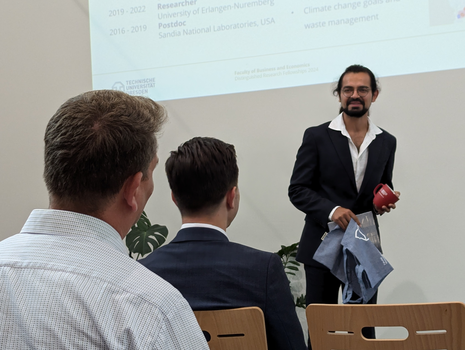
© schwarz
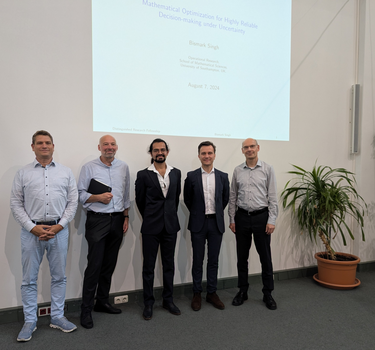
© schwarz
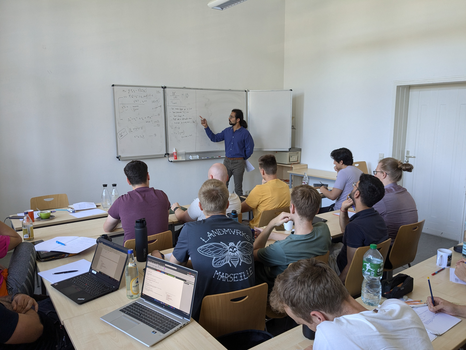
© linß
@Bismark and Tristan: In your case, one fellow works together with three professors from the faculty. How did the collaboration work in this constellation?
Tristan: Bismark was a very good choice for several reasons. Firstly, it enabled us to combine our three research areas, in which each of us contributes our own specialist knowledge. Secondly, it acted as a multiplier that not one person at the faculty but all three of us were able to establish a collaboration with Bismark.
Bismark: During my previous guest visits, I usually had a single host. This time, I have worked with three professors whose expertise overlaps but also complements each other, and this has opened up several avenues for innovative research. This allows us to tackle broader questions and consider future grant applications to which each team member can contribute a unique perspective. In this DRF, my role specifically provides the mathematical content for the decision-making under uncertainty aspect of our energy optimization problem. Overall, I think we integrate well with each other's research interests.
@Bismark and Tristan: What is your conclusion about the Distinguished Research Fellowship program? How will your collaboration continue?
Tristan : Through the Distinguished Research Fellowship Program, I was able to establish a completely new and very fruitful collaboration with Bismark. By funding Bismark's stays, the program not only gave us ample time to get to know each other's research interests, but also to align them in a meaningful way. Looking to the future, I am confident that the momentum we have built will continue. We are working on joint research that was started during Bismark's visits, and I anticipate more visits and joint publications in the future that are a direct result of the DRF program.
Bismark: The program has helped us to find a coherent research project that we are now turning into a publication. In addition, I have also started separate initiatives with other researchers at TU Dresden, all of which have resulted from connections made through this program. The face-to-face aspect facilitated by the DRF has really helped us to align our ideas effectively and makes our subsequent virtual meetings even more productive.
Looking to the future, I sincerely hope to maintain and build on this collaboration with further visits to Dresden or Southampton. I am confident that the momentum we have built will drive our joint research well beyond the official DRF timeframe.

